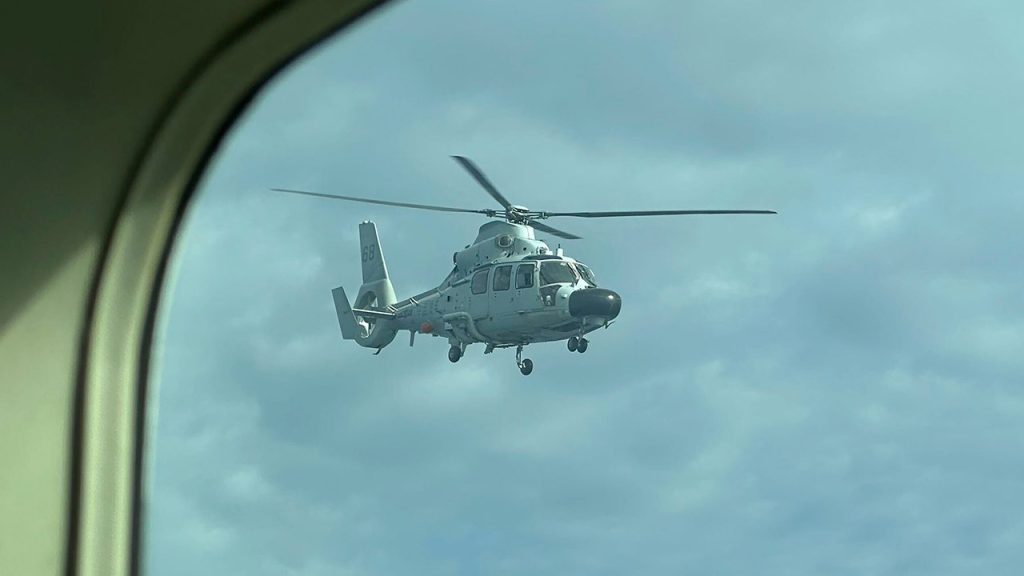In a recent incident in the South China Sea, a Chinese navy helicopter engaged closely with a Philippine patrol plane, prompting serious concerns over air safety and sovereignty. The event unfolded near Scarborough Shoal, a disputed area claimed by both China and the Philippines, as a Philippine Bureau of Fisheries aircraft conducted a routine surveillance mission. As tensions escalate over territorial disputes in this region, both nations have remained steadfast in their claims, with the Philippines advocating for its sovereign rights amidst increasing Chinese military activities.
| Article Subheadings |
|---|
| 1) Incident Overview: Tensions in the Air |
| 2) Philippine Government’s Response |
| 3) The Strategic Importance of Scarborough Shoal |
| 4) Historical Context of the Dispute |
| 5) International Reactions and Implications |
Incident Overview: Tensions in the Air
On Tuesday, February 18, 2025, a Chinese navy helicopter dangerously approached a Philippine Bureau of Fisheries and Aquatic Resources plane, coming within ten feet of the aircraft. This incident occurred while the Philippine plane was on a regular patrol over the Scarborough Shoal, a contested maritime area in the South China Sea. During the encounter, the Filipino pilot communicated via radio, urging the Chinese helicopter to maintain a safe distance. As tensions mounted, the pilot emphatically warned, “You are flying too close, you are very dangerous and endangering the lives of our crew and passengers.” Such close encounters have become increasingly common in this region, raising alarms about the potential for military conflict.
Philippine Government’s Response
In the aftermath of this incident, Philippine officials articulated their commitment to asserting the nation’s sovereign rights. The Philippine Coast Guard and the Bureau of Fisheries emphasized their resolve to uphold maritime jurisdiction in what they refer to as the West Philippine Sea. The statement also criticized China’s aggressive and escalatory tactics, calling for greater accountability and respect for international law. As the region grapples with heightened tensions, experts believe that this incident will likely lead to a formal protest by the Philippine government targeting China’s actions. These developments are testaments to the ongoing struggle for power and influence within the South China Sea.
The Strategic Importance of Scarborough Shoal
Scarborough Shoal, a small group of rocks and reefs, is not just a point of contention; it is strategically significant due to its location in one of the world’s busiest maritime routes. The area is believed to be rich in natural resources, including fish and potential underwater oil reserves, making it a prime target for territorial claims. For the Philippines, maintaining access to the Shoal is vital for local fisheries and national security, whereas China views its control over the area as essential to asserting its broader claims in the South China Sea. The geopolitical stakes involved are immense, with countries such as the Philippines, Vietnam, Malaysia, and Taiwan also vying for influence in these waters.
Historical Context of the Dispute
The tensions surrounding Scarborough Shoal are deeply rooted in decades of territorial disputes. In 2012, a tense standoff between Chinese and Philippine vessels marked a significant escalation in hostilities. After the Philippines brought its case to international arbitration in 2016, the United Nations-backed panel deemed China’s extensive claims to be without basis under international law. Despite the ruling, China has persistently refused to recognize the findings, complicating the region’s diplomatic landscape. Additionally, the Philippines has increasingly felt compelled to strengthen its alliances with global powers, especially the United States, to counter China’s military advancements in the area.
International Reactions and Implications
The international community has been closely monitoring developments in the South China Sea, particularly the incidents involving Philippine aircraft and Chinese military responses. The United States has reiterated its commitment to defending the Philippines, its longstanding treaty ally, should Filipino forces come under attack. This assurance has sparked warnings from China, which cautions against foreign interference in what it claims are domestic disputes. The ongoing tensions highlight the precarious balance of power in the region and the crucial role that international diplomacy plays in minimizing the risk of conflict. As incidents like this become more frequent, the need for clear communication and de-escalation strategies becomes increasingly apparent.
| No. | Key Points |
|---|---|
| 1 | A Chinese navy helicopter approached a Philippine patrol plane within 10 feet, prompting safety warnings. |
| 2 | Philippine officials reaffirmed their commitment to sovereignty and maritime rights in the South China Sea. |
| 3 | Scarborough Shoal is strategically significant due to its natural resources and location on crucial shipping routes. |
| 4 | The historical context of the dispute includes a 2016 UN arbitration ruling against China’s expansive claims. |
| 5 | International reactions, particularly from the U.S., stress the importance of defending regional allies against aggression. |
Summary
The recent incident involving a Chinese helicopter and a Philippine patrol plane underscores the fraught dynamics of sovereignty and territorial disputes in the South China Sea. With both nations asserting their claims amid an increasingly militarized environment, the situation necessitates careful diplomatic engagement to avert conflict. As international interest in the region grows, the actions and responses of both countries will profoundly influence regional stability and future geopolitical relations.
Frequently Asked Questions
Question: What happened during the close encounter between the Chinese helicopter and the Philippine plane?
A Chinese navy helicopter came dangerously close to a Philippine Bureau of Fisheries aircraft, prompting the Filipino pilot to issue safety warnings over the radio regarding the potential danger of the close proximity.
Question: Why is Scarborough Shoal significant?
Scarborough Shoal is strategically important due to its rich fisheries and proximity to major shipping routes, making it a focal point in territorial disputes between multiple Southeast Asian nations and China.
Question: How has the international community responded to the tensions in the South China Sea?
The international community, particularly the United States, has expressed concern about ongoing tensions and reiterated commitments to support the Philippines in defending its territorial claims against perceived aggression from China.


